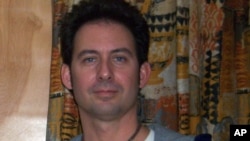The Mississippi man accused of mailing letters with the poison ricin has been charged with threatening U.S. President Barack Obama and others.
Paul Kevin Curtis, 45, appeared in court on two federal charges of threatening the president, U.S. Republican Senator Roger Wicker of Mississippi, and a judge. If convicted, he could face up to 15 years in prison.
The FBI confirmed Thursday that the letters to Obama and Wicker contained ricin.
Investigators said both letters were intercepted at screening facilities away from the White House and Senate offices. The president and Wicker were in no danger.
The AP said Senate sergeant-at-arms Terrance Gainer said the ricin, which was found Tuesday at a Maryland mail processing center, was not weaponized.
Investigators said both letters were intercepted at screening facilities away from the White House and Senate offices and did not place either the president or the senator in immediate danger.
Ricin previously turned up in the U.S. Senate mailroom in 2004, forcing authorities to temporarily shut down two Senate office buildings.
Mail laced with the highly toxic bacterium anthrax appeared in post offices, newsrooms and U.S. congressional offices in the days and weeks following the September 11, 2001 terror attacks on New York and Washington.
Those attacks were later linked to a government scientist who killed himself while under investigation in 2008.
Paul Kevin Curtis, 45, appeared in court on two federal charges of threatening the president, U.S. Republican Senator Roger Wicker of Mississippi, and a judge. If convicted, he could face up to 15 years in prison.
The FBI confirmed Thursday that the letters to Obama and Wicker contained ricin.
Investigators said both letters were intercepted at screening facilities away from the White House and Senate offices. The president and Wicker were in no danger.
The AP said Senate sergeant-at-arms Terrance Gainer said the ricin, which was found Tuesday at a Maryland mail processing center, was not weaponized.
Investigators said both letters were intercepted at screening facilities away from the White House and Senate offices and did not place either the president or the senator in immediate danger.
Ricin previously turned up in the U.S. Senate mailroom in 2004, forcing authorities to temporarily shut down two Senate office buildings.
Mail laced with the highly toxic bacterium anthrax appeared in post offices, newsrooms and U.S. congressional offices in the days and weeks following the September 11, 2001 terror attacks on New York and Washington.
Those attacks were later linked to a government scientist who killed himself while under investigation in 2008.
